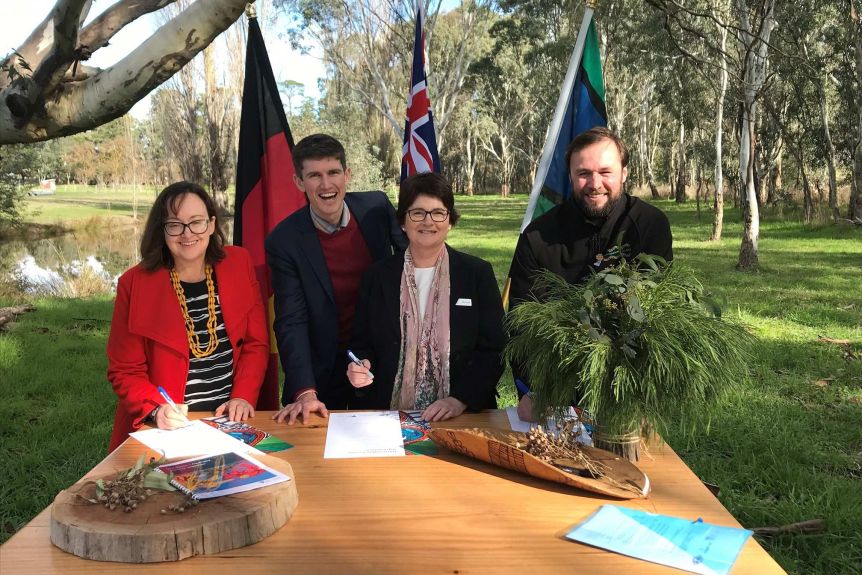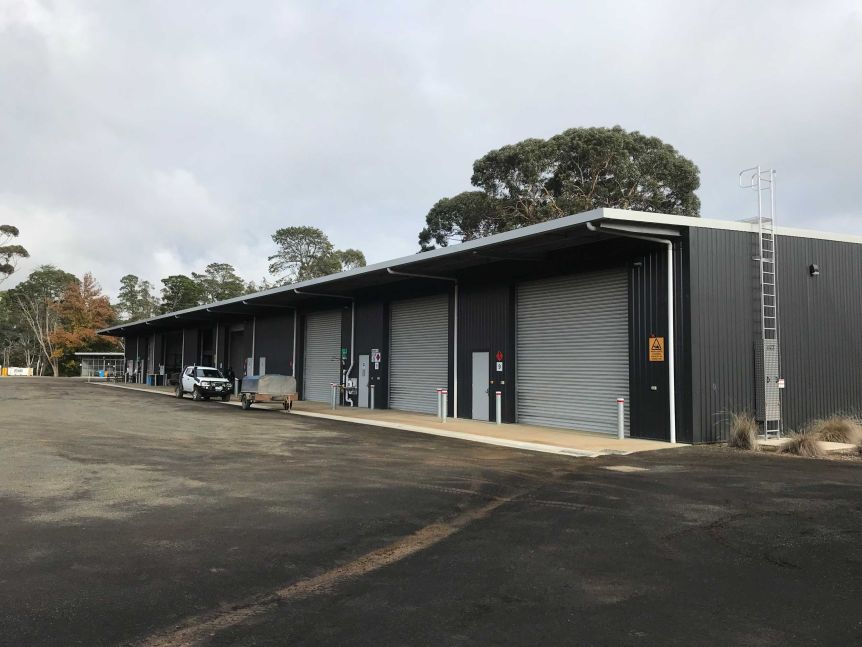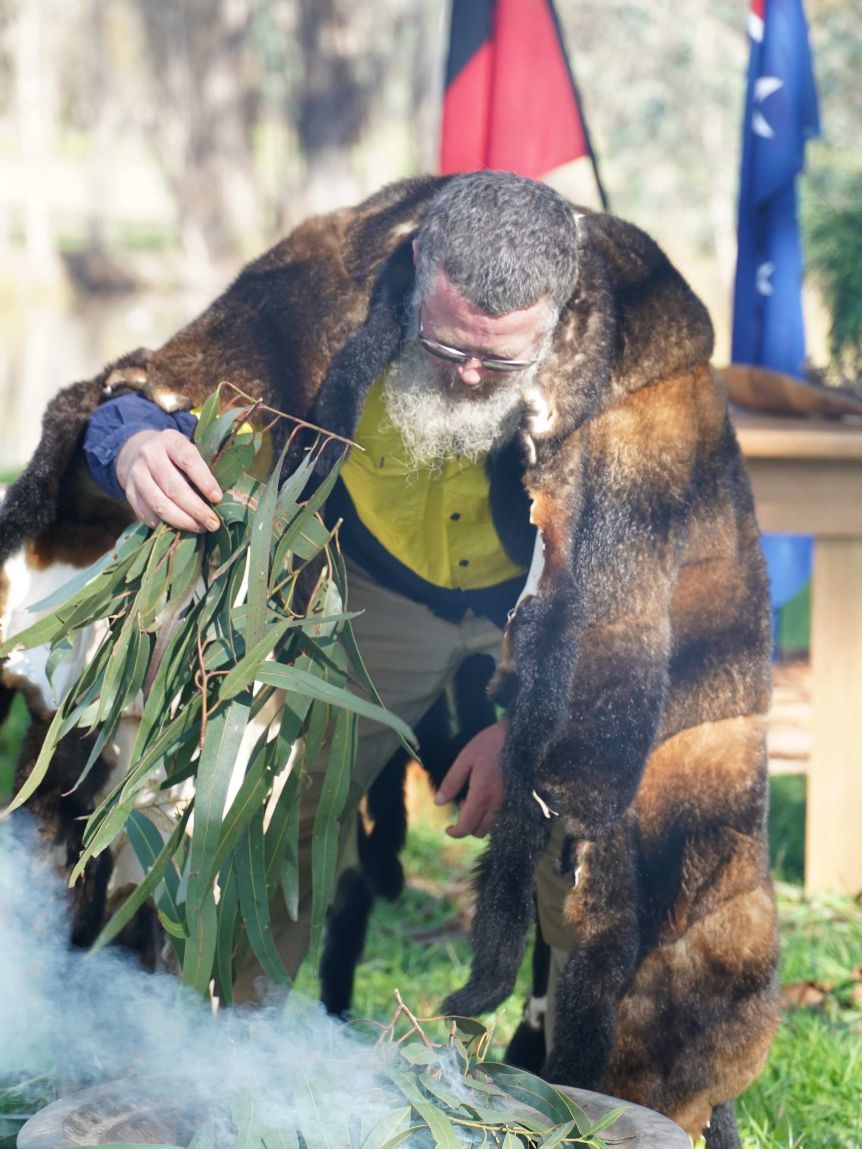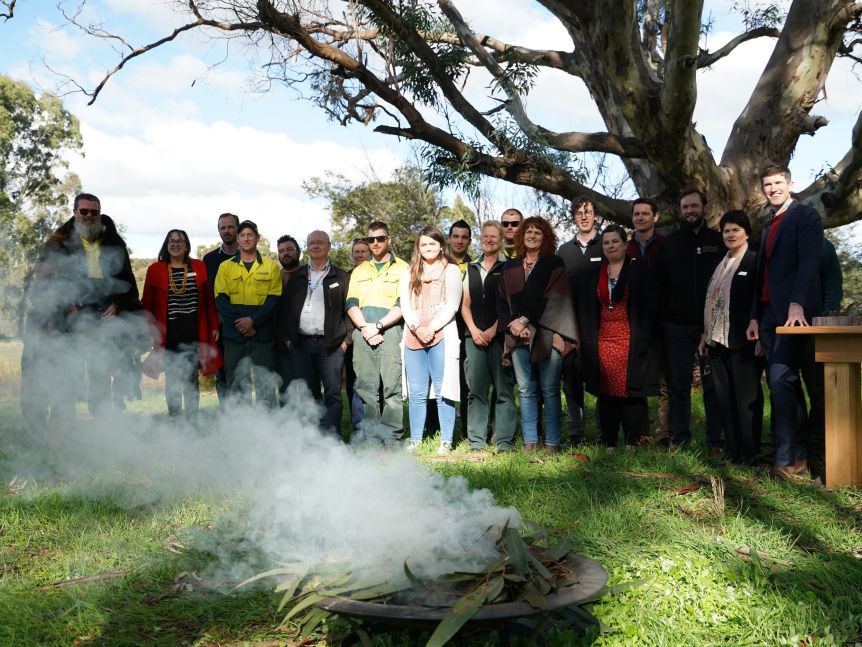
Taungurung Land and Waters Council’s Matt Burns [right] says there’s a “social good” in solar investment.(Supplied: Indigo Power)
A First Nations-owned renewable energy project has been given the green light, with an agreement signed between traditional owners, community, and government in north-east Victoria.
Key points:
- A three-way partnership is signed between traditional owners, DELWP, and Indigo Power to deliver solar power
- Indigo Power will operate the system for 10 years, selling electricity back to the community at a reduced rate
- After 10 years, Indigo Power will transfer ownership of the renewable system back to traditional owners at no cost
The three-way partnership brings together Taungurung Land and Waters Council (TLWC), community energy company Indigo Power, and the Department of Environment, Land, Water and Planning (DELWP) to deliver clean energy to the DELWP Broadford office on Taungurung country.
A 17k/w 50 solar panel system will be installed at the Broadford office in north-east Victoria, funded by an investment from TLWC and managed by Indigo Power to produce up to 30 per cent of DELWP’s energy needs.
TLWC chief executive officer Matthew Burns said, as traditional land managers, Taungurung had an aspiration of investing in environmentally appropriate projects.
“I had the discussion with DELWP late last year about Taungurung investing in the department’s property assets on Taungurung Country,” Mr Burns said.
Mr Burns credited DELWP with its willingness to make the partnership a possibility.
“This exercise has been a very big red-tape-cutting exercise to enable this to come to fruition,” he said.

The Department of Environment Land Water and Planning’s Broadford office will be the site of a First Nations-owned renewable energy system.(Supplied: DELWP Hume Region)
“Over the years you have conversations with departments around ideas of progressing Aboriginal interests, Aboriginal procurement, or Aboriginal engagement and there’s a lot of good intent, however there often isn’t the will.
“Or the policy is inhibiting projects like this to get off the ground.
“I can say without question a number of DELWP staff at all levels have made a concerted effort to make changes to policies, which from our end is really pleasing.”
Regional transition to renewable energy
The Broadford renewable energy agreement is part of the Hume Region Renewable Energy Roadmap project, which was established last year to support north-east Victorian communities’ transition to renewable energy.
Project manager Tom Brown said DELWP has been working hard to build up partnerships and relationships with traditional land owners.
“Taungurung are the traditional owners of that country and the sun has always shone on their country,” Mr Brown said.
 Taungurung Elder Shane Monk performs a smoking ceremony at the signing of the Broadford community energy partnership.(Supplied: DELWP Hume Region)
Taungurung Elder Shane Monk performs a smoking ceremony at the signing of the Broadford community energy partnership.(Supplied: DELWP Hume Region)
“This power station agreement is an opportunity for the department to work with those traditional owners with the support of Indigo Power to capture that renewable resource that’s always been here.
“This will power our office on Taungurung country and support Taungurung to make some local investments that don’t damage the county and that are long-term sustainable projects.”
Community enterprise leading push to renewables
Indigo Power is facilitating the Broadford project through its community-owned renewable energy model.
How the model works:
- Indigo Power sets up a solar power system on a customer’s site, with money invested by the community.
- It owns and operates the solar system for 10 years, selling the electricity generated by the panels back to the customer at a reduced rate.
- During this time, the community investors receive a commercial return on their investment.
- At the end of the 10-year contract, Indigo Power transfers the ownership of the renewable system to the host site at no cost.
- Indigo Power managing director Ben McGowan said it was a model that benefits everyone, as well as the environment.
“Taungurung investment, Indigo Power owned, and DELWP is the customer, a really nice three-way partnership,” Mr McGowan said.
From our perspective it’s showing the possibility that you can create local value and that you can have community value and community benefit from the renewable energy journey.
“Taungurung can have sustainable investment on their Country that benefits them and DELWP can partner with them to make that happen, but also do that in a way that benefits them in that they get clean energy at a reduced rate.”
 Taungurung Land and Waters Council, DELWP Hume Region, and Indigo Power celebrate the signing of their renewable energy partnership, with a traditional smoking ceremony.(Supplied: DELWP Hume Region)
Taungurung Land and Waters Council, DELWP Hume Region, and Indigo Power celebrate the signing of their renewable energy partnership, with a traditional smoking ceremony.(Supplied: DELWP Hume Region)
On Country sustainable income
In October 2018 the Victorian Government, the Taungurung Clans Aboriginal Corporation, and the Taungurung traditional owner group signed a suite of agreements under the Traditional Owner Settlement Act 2010 (Vic), recognising the Taungurung people as the traditional owners of the land.
It was the first time a native title issue had been resolved outside of the Federal Court.
As a not-for-profit organisation that makes decisions around Taungurung Country, Mr Burns said it was crucial TLWC had long-term sustainable income streams to provide services not covered by grant funding.
“Being able to do more things for our communities — whether it is in the cultural space, health or wellbeing, education to break generational disadvantage, other things like that — that we are not funded for,” Mr Burns said.
“These are core goals of ours and an expectation of our members of the Taungurung people to enable us to offer those things.
Investments like this, while they are environmentally friendly, there’s a social good in it, and the income stream is coming back to us to enable us to do some of those other core services.
This article was originally published online HERE.
